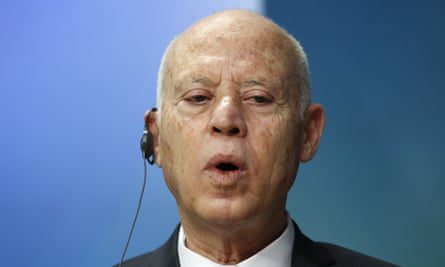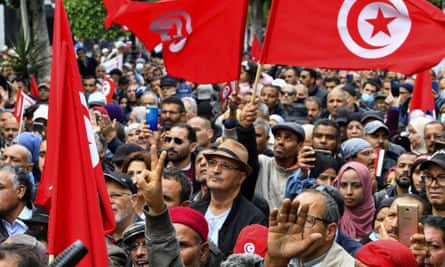Tunisians returned to the polls on Saturday after 11 years since then Self-sacrifice of the seller Effects The fall of a tyrant ruler He unleashed a wave of popular revolts across North Africa and the Middle East.
In the turbulent decade since then, other regional states that once fractured under the weight of popular revolts have been increasingly stifled by counterrevolutions that have held back the civil gains and political freedoms their citizens defended.
despite Tunisia It was the only country to emerge from the Arab Spring protests with a democratic government, and there are fears that Saturday’s elections could end in democracy and cement the return of strongman rule.
The current president, Kais Saied, who in July last year The ruling Tunisian government was overthrown and since then He renewed the constitution to give himself largely unfettered powersexpected to preside over a new legislature with little patronage, weak political parties.
That the elections come on the anniversary of Mohamed Bouazizi setting himself on fire in protest of his treatment at the hands of the authorities, which is very symbolic, and the curtain falls on an era that has come to be known as the Arab Spring – in the place where he was. It all started.

Opposition groups and major political parties said they would boycott the vote, calling it undemocratic and a fig leaf of legitimacy for a power grab that would shred hard-won freedoms.
Neguib Chebbi, head of an anti-Saïd coalition that includes the Islamist Ennahda party, said the elections, which are taking place in an economic crisis fueling poverty, amounted to a “dead farce”.
Still, Saied says a referendum on constitutional reform in July gave a mandate to push through with the changes and claims Tunisians are seeking political certainty after a decade of faltering and often crumbling democracy.
“Tunisia is the latest domino to fall in the region,” said Hamish Kinnear. Middle East and North Africa Analyst at risk intelligence firm Verisk Maplecroft. But looking ahead, nothing is inevitable. Saied may now be dominant – but he may face stiff domestic opposition to his plans to introduce structural economic reforms.
But for now, those who support Tunisia’s new strongman seem drawn to the certainty he offers.
Professor Safwan Al-Masry said: “What made Said popular, and fortified his presidential powers, is that Tunisians lost patience with their elected leaders, as they watched nine successive governments in 10 years make great promises and constantly falter, especially on the economic front.” Dean of Georgetown University in Qatar and author of Tunisia: An Arab Anomaly. “But the economic situation did not improve under Said, and his popularity, always shallow, was waning.”

In neighboring Egypt – whose leadership supported Said’s grab for power – the revolt sparked by the overthrow of Tunisian President Zine El Abidine Ben Ali in 2011 has long since returned to the kind of repressive state rule that characterized the era of the autocrat, Hosni Mubarak. . Although Egypt’s revolutionaries were among the loudest and most powerful in the region, their quest to forge a political ecosystem in which citizens forged their own destinies was largely overwhelmed by a rising police state that appropriated the failures of Mohamed Morsi’s short-lived government. Forced to leave office He was imprisoned in 2013.
“Forging democracy out of the ashes of authoritarian states is a daunting task,” Kinnear warned. Hosni Mubarak may have been ousted in a popular revolution and replaced by an elected leader, but other parts of the old regime—such as the army—remained intact and later helped restore authoritarian rule. Democracy remains fragile even after its establishment.
Al-Masry said that the jury remained out of the debate on whether Tunisia was still able to succeed in its democratic experiment. “Tunisia’s social foundation for democracy – its strong civil society and labor movement, cannot be overlooked, along with its commitment to women’s rights and the visible role women play in public life. As tempting as it is to view all countries in the region through the same prism, it can be misleading. The situation is completely different from what it is, for example, in Egypt, where the army and the labor movement have opposite strengths compared to Tunisia.
H.A. Hellyer, a non-resident scholar at the Carnegie Endowment for International Peace, said the election would not necessarily mark the end of an era. The post-2011 era witnessed revolution and counter-revolution, but it was by no means a final chapter. What we’re seeing are cycles that keep unfolding, as the population insists on paying, then backs off, and status quo systems try to manage them. Kais Said is another note in the story in this regard, but I don’t think he’s crystallized anything yet.”

“Infuriatingly humble analyst. Bacon maven. Proud food specialist. Certified reader. Avid writer. Zombie advocate. Incurable problem solver.”
